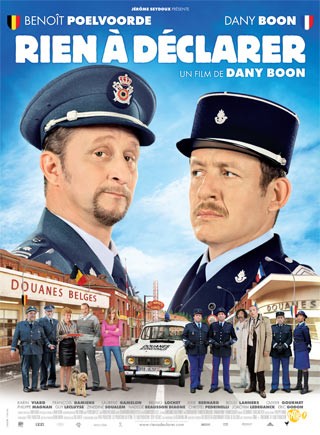dimanche, 06 février 2011
New Dany Boon film plays on France-Belgium prejudice
Ex: http://www.bbc.co.uk/news/world-europe-12325795
New Dany Boon film plays on France-Belgium prejudice
By Hugh Schofield BBC News, Paris
Benoit Poelvoorde and Dany Boon In the film, the two enemies endlessly insult each other's homelands Making fun out of national stereotypes is not exactly standard comic fare
Making fun out of national stereotypes is not exactly standard comic fare
these days, so a new comedy out this week in France represents something of
a gamble for its star and director Dany Boon.
Set at a customs post on the French-Belgian border, Rien a Declarer (Nothing
to Declare) is the long-awaited follow-up to Boon's 2008 blockbuster
Bienvenu chez les Ch'tis (Welcome to the Sticks), which was seen by 20
million people and now ranks as the most popular French film ever.
The new film stays on Boon's home turf of the French far north, where the
locals are known as Ch'tis, drink Ch'ti beer and speak the Ch'ti dialect.
But if Bienvenu chez les Ch'tis was about the cultural misunderstandings
that arise when a French southerner blows in, Rien a Declarer plays on
another set of stereotypes - about Belgians.
Trailer:
http://www.wat.tv/video/bande-annonce-rien-declarer-355kx...
"I wanted to do a film about racism, but I wanted to make it funny" Dany
Boon Director
The year is 1993 and, following the creation of the EU's Schengen
passport-free travel zone, customs posts are to be dismantled along the
Franco-Belgian border.
Dany Boon plays customs officer Mathias, whose opposite number on the
Belgian side seethes with a virulent and irrational hatred of all things
French.
Belgian officer Ruben is played with panache by Benoit Poelvoorde, the actor
who recently vowed to let his beard grow until a government in Brussels is
finally formed.
Old-fashioned humour
Boon and Poelvoorde are condemned to work together when the authorities set
up new bi-national mobile patrols.
There is a thwarted love affair - Mathias with Benoit's sister Louise - a
drugs syndicate and plenty of ribaldry, before finally peace descends in
another feel-good finish.
Belgian actor Benoit Poelvoorde (L) and French director Dany Boon Boon (r)
says he wanted to make a film about racism, but wanted to make it funny
"When I was an arts student, I used to have to cross the border into Belgium
and the guards gave me a hard time because of my long hair," Boon said in an
interview with the BBC.
"Then recently I was back on the border, and these small villages which used
to be dominated by the customs now just stand empty. It was so evocative -
like those dust-blown streets in the Wild West."
Boon's cinema is based on the familiar and the comforting. Experimental it
is not. This is why, to an outsider's eye, much of the humour seems
extraordinarily old-fashioned.
The Poelvoorde character is motivated by a level of exaggerated
ultra-nationalism last seen in mid-19th Century Prussia. In other glaring
anachronisms, he goes to confession in church, and is driven to homicidal
frenzy by the thought of his sister marrying a Frenchman.
Underlying his behaviour are the old national cliches - that the French
think the Belgians are all thick, while the Belgians find the French
arrogant and smug. The jokes abound.
Boon defends himself against charges that he is pandering to the stereotypes
by describing his film as a satire on racism.
Still from Rien a Declarer The film follows the fictional dismantling of
customs posts along the Franco-Belgian border
"I wanted to do a film about racism, but I wanted to make it funny. The way
to do that, it seemed to me, was to focus on a French-Belgian situation.
French and Belgians are basically the same - the same language, the same
skin, the same religion - so the racism is utterly ridiculous.
"If I tried to make a comedy about a real racist situation - say with North
Africans - then it would be too sensitive to work."
Some might say Boon is having his cake and eating it - playing for easy
laughs and being high-minded at the same time.
But in France, the only question that matters is whether Rien a Declarer can
live up to the success of its monumental predecessor, the Ch'tis.
For the critics, the answer so far has been a resounding "Non".
Le Figaro described the film as "empty, lazy and tired", while Liberation
said it was a "reactionary fairy tale". Even crueller was Les Inrockuptibles
magazine, which said it was the sort of film wartime leader Marshal Petain
would ask to see on his deathbed.
It is true that the France as portrayed in Rien a Declarer is a kind of
de-globalised never-never-land where people behave according to
uncomplicated, reassuring patterns.
But then exactly the same could be said of Bienvenu chez les Ch'tis, and
that was the biggest French hit of all time.
The fact is that today's French are suckers for anything that will make them
forget their chronic sense of gloom.
Boon says he is upset by the critiques, but has a way of staying sane.
"I just get out the early reviews of les Ch'tis, and remind myself how the
critics got that one wrong too."
00:13 Publié dans Cinéma | Lien permanent | Commentaires (0) | Tags : cinéma, film, france, belgique |  |
|  del.icio.us |
del.icio.us |  |
|  Digg |
Digg | ![]() Facebook
Facebook



Les commentaires sont fermés.